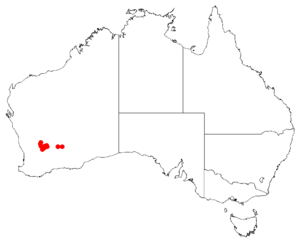Hakea rigida facts for kids
Quick facts for kids Hakea rigida |
|
|---|---|
| Scientific classification |
|
| Kingdom: | Plantae |
| Clade: | Tracheophytes |
| Clade: | Angiosperms |
| Clade: | Eudicots |
| Order: | Proteales |
| Family: | Proteaceae |
| Genus: | Hakea |
| Species: |
H. rigida
|
| Binomial name | |
| Hakea rigida Haegi
|
|
 |
|
| Occurrence data from Australasian Virtual Herbarium | |
| Script error: The function "autoWithCaption" does not exist. | |
Script error: No such module "Check for conflicting parameters".
Hakea rigida is a special type of shrub, a bit like a bush, that grows in a specific part of Western Australia. It's found in the western Goldfields region. This plant is known for its beautiful sprays of pink flowers that bloom in spring.
What it Looks Like
Hakea rigida is a dense shrub that can grow from about 0.6 to 2.7 meters (2 to 9 feet) tall and wide. When it flowers, its small branches are covered with soft, silky hairs.
Its dark green leaves can look different. Some are like needles, about 3.5 to 14 centimeters (1.4 to 5.5 inches) long and 1 to 2 millimeters (0.04 to 0.08 inches) wide. These needle-like leaves are often twisted where they join the branch. Other leaves are flat and thick, with 5 clear lines running along them.
The flowers grow in groups called racemes (say: RAY-seems) in the leaf corners. There are usually 18 to 20 flowers in each group. They can be deep or pale pink and have a sweet smell. The main part of the flower, called the perianth (say: PEH-ree-anth), is bright pink. The pistil (say: PIS-til), which is the female part of the flower, is about 6.5 to 8 millimeters (0.26 to 0.31 inches) long.
After flowering, the plant produces fruits that are either oblong or egg-shaped. They are about 2 centimeters (0.8 inches) long and 1.5 centimeters (0.6 inches) wide and grow in small bunches. The fruit surface is mostly smooth, sometimes with small bumps, and ends with a tiny beak shape. This plant usually flowers from September to October.
How it Got its Name
The plant Hakea rigida was officially described in 1999 by a botanist named Laurence Haegi. He wrote about it in a book series called Flora of Australia. Haegi decided to keep the name that another botanist, Charles Austin Gardner, had already used for plant samples.
The second part of its name, rigida, comes from the Latin word rigidus, which means "rigid" or "stiff." This likely refers to how stiff the leaves of the plant are.
Where it Grows
Hakea rigida is not a very common plant. It grows in a few specific areas in Western Australia, including places like Beacon, Bonnie Rock, Westonia, and the Yilgarn region north of Southern Cross.
You can find it in different types of environments. It grows in areas with mallee-shrubland (where there are many small, multi-stemmed trees and bushes), open sandy plains, and even in gravelly soils.
Conservation Status
Because Hakea rigida is quite rare, the Government of Western Australia's Department of Parks and Wildlife has given it a special classification: "Priority Two."
This means that the plant is considered rare or at risk. It's only known to exist in a very small number of locations, usually between one and five different populations. This classification helps protect the plant and its habitat so it can continue to thrive.
 | Delilah Pierce |
 | Gordon Parks |
 | Augusta Savage |
 | Charles Ethan Porter |

